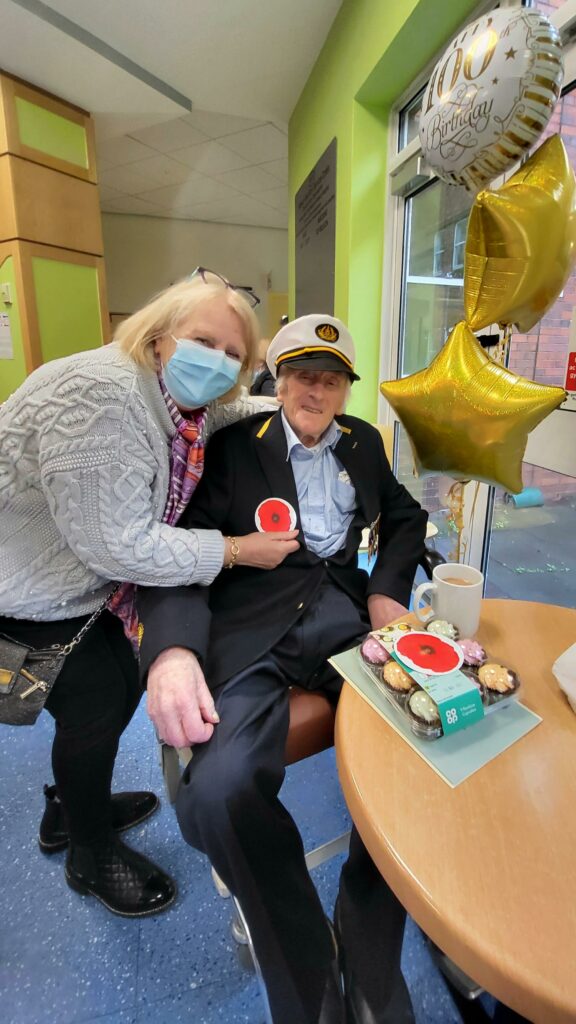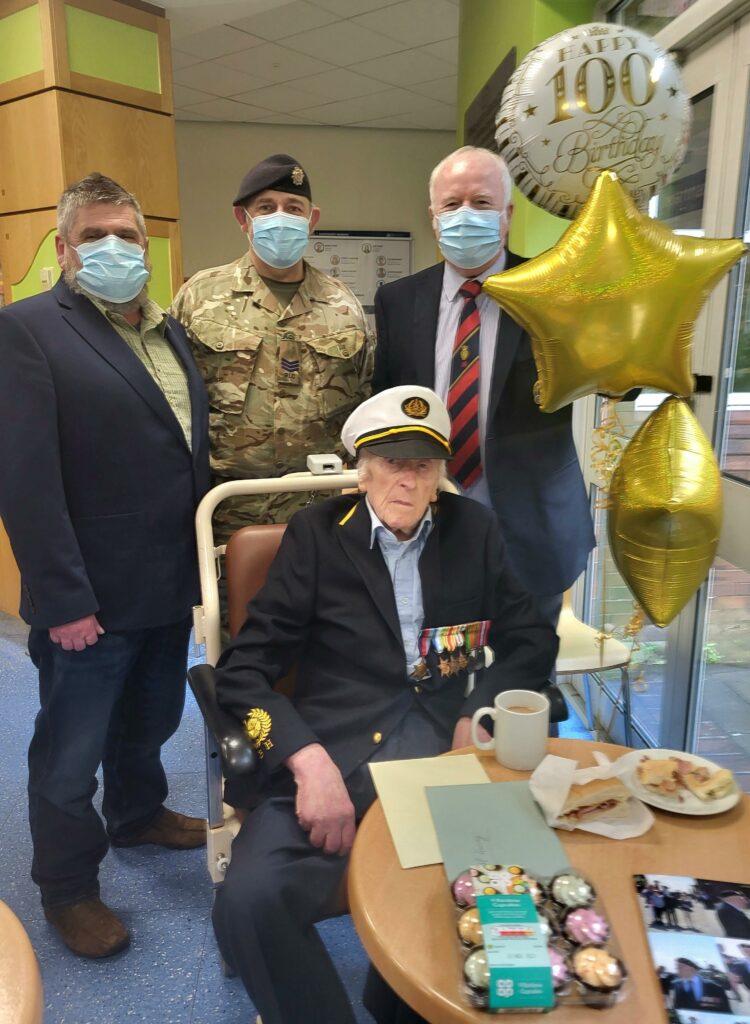Veteran Celebrates 100th Birthday at Wrexham Maelor Hospital

We were delighted to hear that Betsi Cadwaladr University Health Board’s (BCUHB) Armed Forces Lead, Zoe Roberts recently had the pleasure of sharing veteran inpatient Mr Steven Harvey’s 100th Birthday celebrations in their ‘Veteran Aware’ hospital Wrexham Maelor.
BCUHB received funding under our Supporting Armed Forces in Acute Hospital Settings programme which supported a small number of pilot projects to identify better ways of supporting veterans and their families when they are in a hospital setting.
BCUHB established the North Wales Veteran Healthcare Collaborative to improve NHS care for the Armed Forces Community across North Wales. All three of the health board’s acute hospitals, Wrexham Maelor, Ysbyty Glan Clwyd and Ysbyty Gwynedd have now received accreditation as ‘Veteran Aware’ from the Veteran Covenant Healthcare Alliance (VCHA). As part of their improved support, BCUHB has developed a dedicated information hub for staff members, outlining the support available for the Armed Forces Community, and their Poppy Programme which helps identify Armed Forces community patients on admission.
My Harvey’s family provided a brief summary of his life during WW2:
Aged 16 in 1939 Steven signed on as cabin boy in the Merchant Navy and sailed around the world. In 1942 he served as a steward on the North Atlantic Convoy route. In June 1942 he enlisted in the British Army and was sent for training at an RASC base in Chesterfield. After training he joined a Light Anti-Aircraft Platoon supplying troops. In November 1942 his unit along with 3,000 other soldiers boarded a troop ship in Greenock and joined a Convoy off Ireland with no knowledge of where they were headed. As they were passing through the Straits of Gibraltar, they were told they were part of the 1st Army which was about to invade French Algeria.
On 8th December 1942, they landed at Algiers and after a short battle the Vichy French Forces surrendered. He saw action throughout the North African campaign as a driver of a Bedford Truck and took part in the Battle of The Kasserine Pass (Rommel’s last Victory) and the many hard-fought battles against the Germans in the attack on Tunisia. In the mountains of Tunisia, he was driving his truck on unmade roads constantly harassed by the foul winter weather and by the Luftwaffe who had air superiority for most of the Tunisian campaign. On May 9th, 1943, the Germans and Italians surrendered, and the 1st Army met up with the 8th Army. He was in the Victory Parade in Tunis on May 10th when General. Montgomery took the salute.

On 13th July 1943, the 1st Army, now part of the 8th Army, invaded Sicily. Steve’s unit landed on the 26th July and served there until The Germans and Italians retreated to the Italian mainland. On the 3rd September 1943 the 8th Army invaded the Italian mainland, and he joined the invasion.
Steven trained as a Waterman in July 1944 and as a Lance Corporal he commanded an Italian schooner sailing from the east coast of Italy supplying partisans in German occupied Yugoslavia. After the German surrender in May 1945, he spent the next 18 months dumping unexploded ammunition in the Adriatic with a German POW crew. When offered a flight home he refused, like many soldiers because of rumours of plane losses, and took the long train journey home. Mr Harvey was discharged in October 1946.
Armed Forces Lead Zoe Roberts was joined by fellow Veteran Support Service Colleagues Dr Paul Hughes (Anaesthetics) and Matron Amy Hughes (Theatres), alongside colleagues from the Royal British Legion; Adrian Leslie and George Rogerson, and also Army Reserve Sgt John Currie from 398 Transport Squadron 157 (Welsh) Regiment Royal Logistics Corps (Queensferry). The team chatted to Mr Harvey and his family about the recent roll-out of the BCUHB Poppy (Veteran Identification) Programme, and they were thrilled to hear of the support available to the Armed Forces Community, and in particular, veterans across North Wales.
Find out more
You can find out more about the Supporting Armed Forces in Acute Hospital Settings on our dedicated programme page.